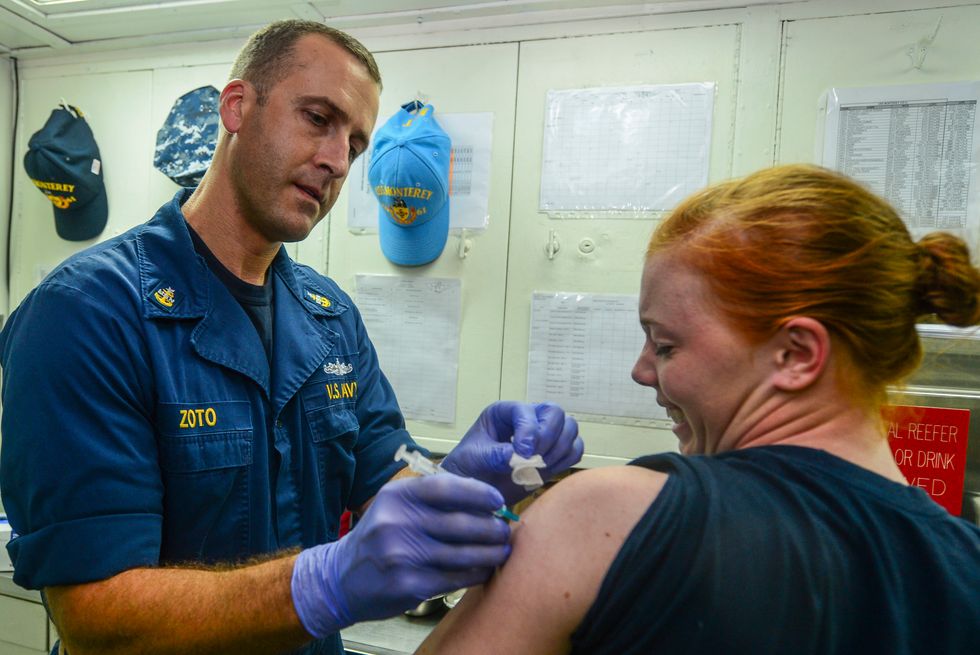The Anti-Vax Movement Is Still Out There, But There's No Reason It Should Be
Anti-vaccine arguments have been proven by health professionals and researchers to be untrue time and time again, so why would people still choose to believe false, and possibly harmful information?
In 2000, measles was officially declared eradicated from the United States, but since I started college, I've had two cases of emails regarding a fellow student in different lectures being diagnosed with measles. I don't think these cases are directly linked to anti-vaccine rhetoric, but we can attest this rhetoric to other outbreaks. In 2018, there were just over one hundred cases in twenty-one states. Considering this disease was eradicated almost twenty years ago and the vaccine for it is required for many children to enter school, that's a pretty concerning number.
I don't mean to discount the right of parents to raise their children however they want nor people with fears of needles so great that the idea of vaccination may be too much for them. We cannot guarantee that vaccinations will prevent a disease every single time. However, when we're seeing diseases like measles reemerge slowly but surely throughout the country, we need to remind ourselves of what's the truth about the anti-vaccination rhetoric. It's vital to remember who to really go to about these issues beyond ideas posted all over the internet and remind ourselves of what the actual facts are behind popular anti-vaccination ideas.
With the case of Ethan Lindenberger, who testified to a Senate Committee recently about his experience opting to get vaccinated after doing research in spite of his anti-vaccine mother, we can all learn a lesson about sources to go to when it comes to this subject. The first person you should always go to if you have any questions or concerns about any kind of vaccination is your doctor, especially when regarding children. If you don't necessarily feel comfortable asking your doctor or a certified health professional, then I recommend taking a look at the same sources Ethan Lindenberger cited in his testimony, including the CDC, the World Health Organization, and other accredited medical sources.
These sources are based entirely on scholarly, proven research done by credited, respected professionals in the health field who know what they're talking about. Base your stance on vaccinations on these sources and not the hearsay or speculation of unproven research many anti-vaxxers seem to rely heavily upon. Your doctor took an oath to work for the health of their patients and went through years of schooling on matters like these while almost all anti-vaxxers didn't, so know who is the right source to listen to on the matter.
On the subject of sources, we need to remind ourselves of the study that began the modern anti-vaccination movement and the fact it was all fabricated. In the 1990s, Dr. Wakefield claimed to have found a link between autism in children and the Measles-Mumps-Rubella vaccine, a vaccine required by most schools even today. The story was picked up by several media outlets, and created the anti-vaccine movement of the modern day, with celebrities like Jenny McCarthy using the ideas of the study to further spread the ideas of the movement further. However, it was later revealed and confirmed through research done later that Dr. Wakefield and those researching with him had created false conclusions and had therefore made up the link between autism and vaccines.
As a result, Dr. Wakefield has been discredited and had his medical license revoked. This kind of falsified information still runs through the veins of the anti-vaccine movement. Not only are these kinds of claims insanely incorrect, but they create a stigma that autism is caused by an outside source, instead of a natural and complex developmental disorder that cannot be explained away by false claims. Autism has been around much longer than any vaccines have, and saying that any vaccinations put children at a higher risk of being on the spectrum is an extremely incorrect and disgusting claim to make.
Vaccinations are not an easy subject—neither is medicine in general—and to think you know everything or as much about them when you are not a health professional is extremely ignorant.
Professionals have spent years doing proven, accredited research on the subject, and to believe one person who has no idea what they're talking about on Facebook say vaccines are bad undermines the proven vaccination research done for the good of all people, and puts others at risk.
We live in a society privileged enough to have vaccines for diseases like measles, influenza, and polio that used to wholly change the way people had to live their lives and even killed people. Not all of the world is privy to such technology, as there are people throughout the world who still risk having to face and fight such diseases. So consider nothing but facts when looking at issues like vaccinations, and consider the amount of proven research and heart that has gone into both sides before truly deciding your stance on this issue, which is extremely important both in personal and more widespread terms.




























